Welsh devolution referendum, 1979
| Welsh devolution referendum, 1979 | ||||||||||||||||||||||
|---|---|---|---|---|---|---|---|---|---|---|---|---|---|---|---|---|---|---|---|---|---|---|
| Do you want the Provisions of the Wales Act 1978 to be put into effect? | ||||||||||||||||||||||
| Location |
| |||||||||||||||||||||
| Date | 1 March 1979 | |||||||||||||||||||||
| ||||||||||||||||||||||
| ||||||||||||||||||||||
The Welsh referendum of 1979 was a post-legislative referendum held on 1 March 1979 (Saint David's Day) to decide whether there was sufficient support for a Welsh Assembly among the Welsh electorate. The referendum was held under the terms of the Wales Act 1978 drawn up to implement proposals made by the Kilbrandon Report published in 1973.
The plans were defeated by a majority of 4:1 (20.3% for and 79.4% against) with only 12% of the Welsh electorate voting in favour of establishing an assembly. A second referendum to create a devolved assembly for Wales was held in 1997, which led to the enactment of the Government of Wales Act 1998 and the creation of the National Assembly for Wales in 1999.
Background
Both the Scotland Act and the Wales Act contained a requirement that at least 40% of all voters back the plan. It had been passed as an amendment by Islington South MP George Cunningham with the backing of Bedwellty MP Neil Kinnock.
Kinnock, the future leader of the Labour Party, called himself a 'unionist'. His stated view was that "between the mid-sixteenth century and the mid-eighteenth century Wales had practically no history at all, and even before that it was the history of rural brigands who have been ennobled by being called princes".[1] He was one of six south Wales Labour MPs who opposed their own Government's plans, along with Leo Abse (Pontypool), Donald Anderson (Swansea East), Ioan Evans (Aberdare), Fred Evans (Caerphilly), and Ifor Davies (Gower).
The government of Jim Callaghan did not have an overall majority in the House of Commons, and was therefore vulnerable to opposition from within its own ranks. The Labour party was split on home rule for Wales with a vocal minority opposed. They considered devolution as a danger to the unity of the UK and a concession to Welsh nationalism in the wake of by-election victories by Plaid Cymru.
The Labour Party committed itself to devolution after coming to power in the February 1974 General Election. It followed the findings of a Royal Commission on the Constitution under Lord Kilbrandon. Set up in 1969 in the wake of pressure to address growing support for independence in Scotland and Wales it delivered a split report in 1973. The Royal Commission recommended legislative and executive devolution to Scotland and Wales, with a minority supporting advisory Regional Councils for England. This plan was rejected as too bureaucratic and ill-advised in economic terms. New plans were brought forward by Harold Wilson's government in 1975 and 1976 which confined devolution to Scotland and Wales.
The Scotland and Wales Bill had a difficult passage through Parliament and the government, lacking a majority to pass the plan, withdrew the legislation and introduced separate Bills for Scotland and Wales. Hostile Labour MPs from the north of England, Wales and Scotland combined to insist that Assemblies could only be passed if directly endorsed by voters in a post-legislative referendum.
The Welsh Assembly proposed in the Wales Act 1978
 |
| This article is part of a series on the politics and government of Wales |
|
Law and justice |
|
Wales in the EU |
Structure
Had the Wales Act 1978 entered force, it would have created a Welsh Assembly without primary legislative or tax raising powers. The proposed assembly would have had 72 members elected by the first past the post system and would have met at the Coal Exchange in Cardiff.
It was planned that assembly would have operated under the committee system where subject committees would be formed with representation of all groups in the assembly.[2]
Powers
The assembly would have had the ability to pass secondary legislation with responsibility for primary legislation remaining with the UK Parliament at Westminster. It would have taken over the powers and functions of the Secretary of State for Wales.
The proposed assembly would have had responsibility for:
- housing
- health
- education
- planning
- management of the Welsh Development Agency
- appointments to Welsh quangos
- it would be able to aid the development of:
- Welsh language
- museums and galleries
- libraries
- arts and crafts
- sport
- culture
- recreation[2]
Results
| Choice | Votes | % |
|---|---|---|
| |
956,330 | 79.74 |
| Yes | 243,048 | 20.26 |
| Valid votes | 1,199,378 | 99.72 |
| Invalid or blank votes | 3,309 | 0.28 |
| Total votes | 1,202,687 | 100.00 |
| Registered voters and turnout | 2,038,048 | 59.01 |
| Source: BBC | ||
By County council area
| Council Area | Turnout | Yes votes | No votes | Yes (%) | No (%) |
|---|---|---|---|---|---|
| Clwyd | 51.1% | 31,384 | 114,119 | 21.6% | 78.4% |
| Dyfed | 64.6% | 44,849 | 114,947 | 28.1% | 71.9% |
| Gwent | 55.3% | 21,369 | 155,389 | 12.1% | 87.9% |
| Gwynedd | 63.4% | 37,363 | 71,157 | 31.4% | 65.6% |
| Glamorgan (Mid) | 58.6% | 46,747 | 184,196 | 20.2% | 79.8% |
| Glamorgan (South) | 58.1% | 21,830 | 144,186 | 13.1% | 86.9% |
| Glamorgan (West) | 57.5% | 29,663 | 128,834 | 18.5% | 81.5% |
| Powys | 66.0% | 9,843 | 43,502 | 18.7% | 81.3% |
Aftermath
The referendums in Scotland and Wales coincided with a period of unpopularity for the Government in the wake of the winter of discontent.
Proposals for a more powerful Assembly in Scotland attracted the support of a small majority of those who voted (1,230,937 for, 1,153,502 against) (see Scotland referendum, 1979), but it amounted to just 32.5% of the total electorate, lower than the 40% threshold required.
The results sealed the fate of the minority Labour government, and as a direct result of the defeat of the referendums in Wales and Scotland the Scottish National Party (SNP) withdrew its support for the government.
In the House of Commons on 28 March 1979, the Labour government was defeated on a motion of no confidence by one vote, only the second time in the 20th century that a government was brought down in this way. Labour's defeat in the 1979 General Election to Margaret Thatcher's Conservative Party precipitated a civil war within its own ranks, and the party was to be out of office for eighteen years.
References
- ↑ Evans, Gwynfor (2000). The Fight for Welsh Freedom. Talybont: YLolfa Cyf. p. 7. ISBN 0-86243-515-3.
- 1 2 "Welsh Referendum". Bbc.co.uk. Retrieved 7 October 2014.
